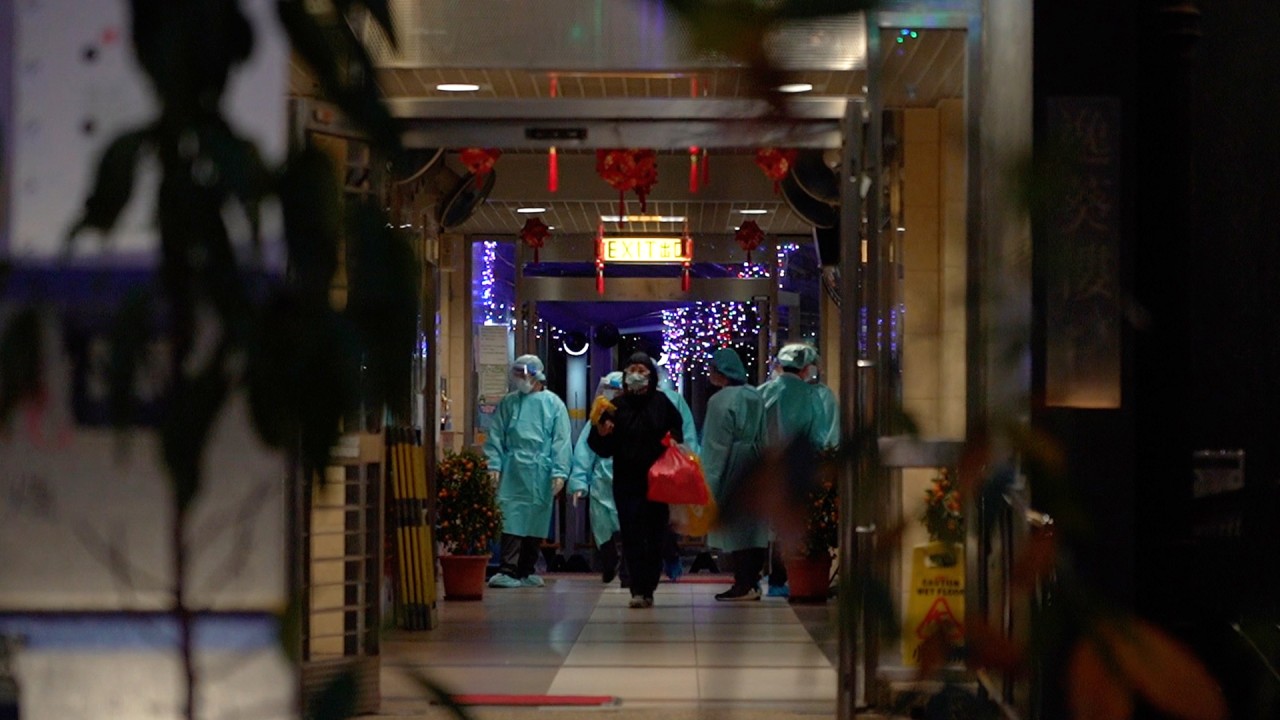
03:01
Coronavirus: ‘exponential’ outbreak of Omicron triggers lockdowns in Hong Kong housing blocks
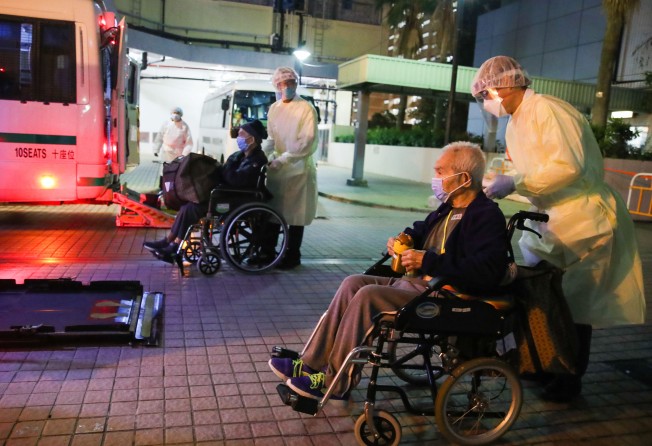
Hong Kong authorities placed a second block of flats under lockdown for five days at a coronavirus-hit public housing estate after an “exponential” surge of more than 100 infections in a single day, dashing hopes of any significant relaxing of social-distancing rules during the Lunar New Year period.
Saturday marked two years since the start of the Covid-19 epidemic in Hong Kong as Chief Executive Carrie Lam Cheng Yuet-ngor also announced that an overnight lockdown would be imposed on four blocks of Kwai Chung Estate, while the remaining 10 would be issued with a mandatory testing notice. Infections have been reported in at least four buildings on the sprawling estate, home to almost 35,000 residents.
“An exponential outbreak has happened on this estate,” Lam said, noting the number of infections had jumped fivefold to at least 105 from Friday to Saturday. “According to information from the World Health Organization, the [Omicron] variant can increase confirmed infections exponentially in two to three days.”
The escalating public health crisis prompted discussion about the greater implications for China’s battle against the coronavirus, with a pro-Beijing newspaper calling it a war that could threaten national safety and urging Hong Kong to seek help from the central government if needed while preparing for a worst-case scenario.
Health officials confirmed 26 new coronavirus cases citywide on Saturday, all but one locally transmitted. Three were untraceable. The additions brought the tally of confirmed cases to 13,146, with 213 related deaths.
The unprecedented operation in Kwai Chung has escalated sharply from an overnight lockdown of a single block three days ago to encompassing the entire estate.
First to be placed under a five-day lockdown were the 2,700 residents of Yat Kwai House on Friday night. Officials then identified eight infections at Ying Kwai House on Saturday, triggering a five-day operation there too.
Ten of Saturday’s confirmed cases were linked to Yat Kwai House. A total of 96 cases, including preliminary ones, had been recorded there as of Saturday evening. By Sunday morning, another 12 preliminary-positives had been identified.
Chin Kwai House and Hiu Kwai House, which recorded preliminary-positive cases, as well as Yuk Kwai House and Nga Kwai House, were put under overnight lockdowns.
Lam said the outbreak was likely to mean social-distancing measures would remain in place for a longer period.
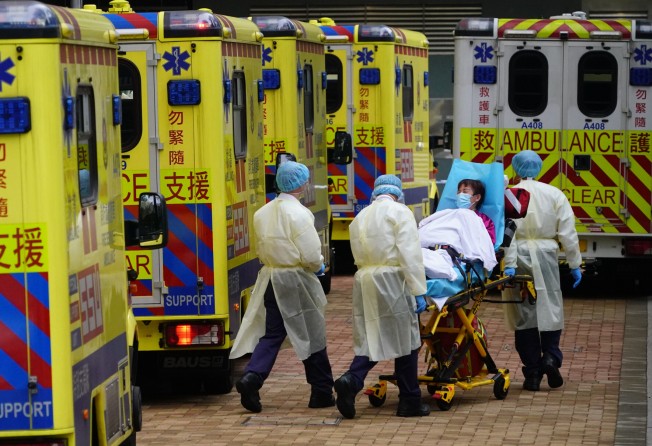
“The chance of having a large-scale relaxation of social-distancing measures on the fourth day of Lunar New Year is rather slim,” she said, referring to the February 4 expiry date of the current curbs.
All government employees living on the estate were told on Saturday they would not need to return to their workplace until further notice. Civil service minister Patrick Nip Tak-kuen also urged other employers to follow suit if possible. The Education Bureau asked schools with staff who live on the estate to allow them to stay at home, while schools in the affected area should stop activities until after the Lunar New Year holiday. Most in-person classes were already stopped across the city under a previous social-distancing measure.
Asked if the government had moved too slowly in containing the virus on the estate, with infections jumping from nine cases to triple digits in just two days, Lam did not directly address the question.
“Of course it would be good if we could impose effective measures as early as possible. But this is not solely scientific work,” she said. “It’s not like we could just press a button and implement those measures if anything happened.”
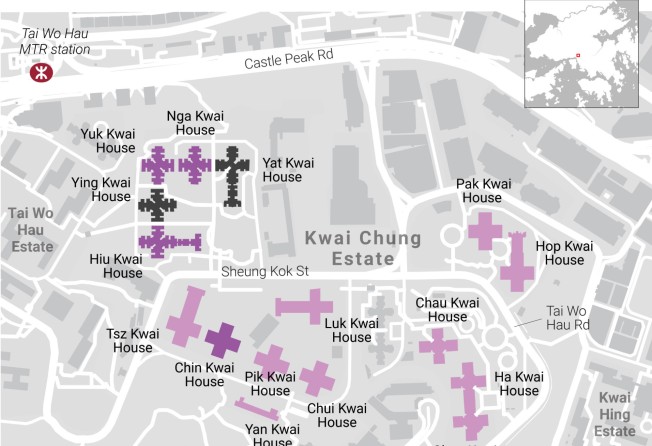
Residents of Yat Kwai House complained of chaotic arrangements and being made to wait for Covid-19 testing, while officials said meal boxes could not be arranged for those in Ying Kwai House on Saturday evening because of a lack of preparation time.
With the public forbidden from entering restricted areas, food deliveries would not be allowed. Ying Kwai House residents were placed under lockdown at 4am, leaving them no time to buy supplies.
Despite the rapid spread of Omicron in the community, Lam said the government would not give up its “dynamic zero-infection” strategy.
“Hong Kong does not possess the prerequisites [to live with the virus],” Lam said. “We still want to open the border, not only with the mainland but also the rest of the world. Secondly, our vaccination rate is not yet ideal.”
Asked if estate residents would be compensated, Lam said Hong Kong was “acting in concert” to tackle the pandemic and many people, as well as businesses, would inevitably be affected by measures including the tightening of social-distancing rules, overnight lockdowns and compulsory testing.
“Apart from this lockdown … we have been putting a lot of people in quarantine for a much longer period so they will be out of a job for much longer,” she said. “I’m extremely grateful to all those people who have been adversely affected.”
Lam stressed that the government would need to protect the city’s health care system from collapsing due to a rapid surge of infections.
Health officials earlier warned Omicron could go undetected in the community.
“The Omicron variant is a bit hard to control because many patients are asymptomatic. Even if they do [catch it], they are flu-like symptoms, so some people may underestimate the situation,” Dr Chuang Shuk-kwan of the Centre for Health Protection told a press briefing earlier on Saturday.
“There really isn’t much of an influenza season in Hong Kong at the moment. If you have symptoms, you’re more likely to have Covid-19. If you feel unwell or have visited high-risk places, please go and get tested.”
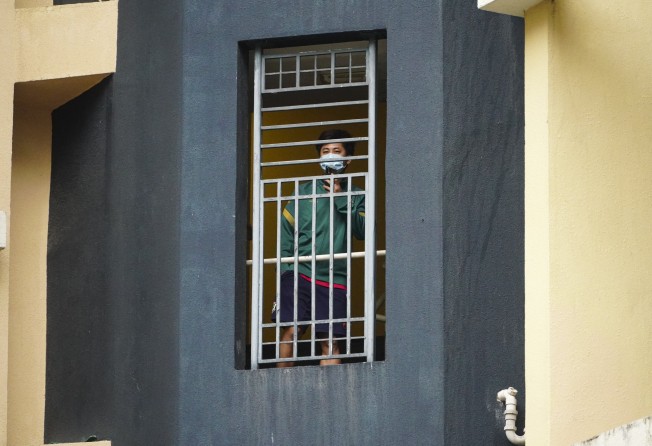
Among the six preliminary-positive cases in Ying Kwai House was a patient care assistant at Princess Margaret Hospital, who infected another colleague.
Another suspected case in the block involved a 49-year-old nurse who dispensed medicine at two homes for the elderly in the area. Although the nurse had received two doses of the BioNTech vaccine, health authorities said most of the elderly were unvaccinated.
An unvaccinated man believed to have contracted the coronavirus from his wife had visited Yat Kwai House on January 13 to collect items from refuse stations to resell in Sham Shui Po.
The wife, who had recently returned to the city from Pakistan, tested positive for the highly transmissible Omicron variant days after her three-week quarantine at the Silka Seaview Hotel ended, leading experts to believe she had caught Covid-19 from a fellow guest through cross-infection.
Health officials on Friday said they believed the husband infected a 64-year-old female cleaner at the estate, who spread the virus to residents and building staff. The cleaner lives at Ying Kwai House.
Some environmental samples taken from Yat Kwai House, including lift buttons and the door handle inside a refuse chamber, tested positive for the coronavirus.
“The only people who work inside [the chamber] should be the cleaners, so it’s possible some who were infected went to each floor to clean and collect rubbish and may have contributed to the spread of the virus,” Chuang said.
Another cleaner who lived in Hiu Kwai House and served the entire estate also tested preliminary-positive. More than 40 cleaners worked on the estate, and they were all hired by the same contractor, Chun Wui Kee.
Elsewhere in the city, a Delta cluster linked to pet shops grew to nine people, with the latest infection involving a customer at Little Boss in Causeway Bay. The variant is believed to have entered the city through the importation of hamsters, triggering a cull of 2,000 of the pets.
Government pandemic adviser David Hui Shu-cheong said the variant was not present in Hong Kong until it was uncovered that the hamsters were found to carry a mutation linked to the strain, making it “highly probable” it entered the city through the importation of the animals.
The three untraceable confirmed cases were a retiree who lives at Tai Wo Hau Estate, a man at Lam Tin Estate and who carries the L452R mutation linked to the Delta variant and a construction worker in Sham Shui Po. The genetic sequence result of the worker’s sample matched that of the woman who was infected at the Silka Seaview Hotel.
The Centre for Health Protection said it had also found that among 738 environmental samples taken from 40 pet shops and relevant warehouses, 30 tested positive. Authorities have asked pet shops and owners to hand over their hamsters and said they had received 77 of the animals so far.
Separately, a study by University of Hong Kong microbiologists found that Omicron was less effective in replicating cells and causing diseases than the original coronavirus, known as SARS-CoV-2, that causes Covid-19, as well as the Alpha, Beta and Delta variants.
The research team, led by government pandemic adviser Professor Yuen Kwok-yung, found that Omicron was more than three times less efficient at viral multiplication compared with the original Covid-19 strain in human lung cells, while the other variants replicated at similar or higher levels than the original.
“Our findings suggested that the mutating SARS-CoV-2 tries to escape from the control of our immune system which has been activated by vaccines or natural infection,” Yuen said. “But in doing so, the virus has to pay a price by becoming less efficient in multiplying. We hope the virus will continue to follow this trajectory of evolution to become a mild common cold coronavirus.”